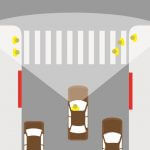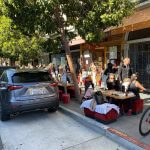Taking action to end traffic violence in the Tenderloin: let’s talk June 18
Traffic crashes are all too common in the Tenderloin
Traffic violence is a daily reality for the nearly 40,000 people who live in the Tenderloin. Every single street in the Tenderloin is designated as “high-injury” in terms of traffic crashes.
In 2019, four pedestrians were hit and killed in the Tenderloin: Janice Higashi, Mark Swink, Michael Evans, and Benjamin Dean. Hundreds more were injured in traffic crashes, including a 12-year-old boy walking home from an afterschool program. Ask someone who lives or works in the Tenderloin if they’ve ever witnessed someone get hit while walking, and they usually have more than one story.
Fast-moving traffic shouldn’t be zooming through a neighborhood that’s home to one of the highest concentrations of children, seniors, immigrants, and people of color in the city. This feels especially unjust considering few of the mostly very low-income residents of the Tenderloin even own cars.
Let’s talk about how to end traffic violence in the Tenderloin
On Thursday, June 18, at 10:00 AM, I’ll be talking with Evan Oravec, Community Organizer with the Central City SRO Collaborative and Jennifer Molina, Senior Transportation Planner at SFMTA about what’s been happening since 2018 to put an end to traffic violence in the Tenderloin.
Join in the online conversation being hosted by UC Berkeley SafeTREC & California Walks. Register here.
The Tenderloin Traffic Safety Task Force: a force for change
The Tenderloin Traffic Safety Task Force came together in the fall of 2018 to demand the city invest in and work alongside residents to make streets safer. The San Francisco Bicycle Coalition facilitated the Task Force as it got off the ground, bringing together neighbors, community-based organizations, and transportation advocates (including Walk SF; we facilitated the group in 2019).
The Task Force wasted no time in determining its initial asks: reduce vehicle speeds neighborhood-wide; make serious changes to calm traffic on Taylor Street ASAP; and designate a project manager from SFMTA for the Tenderloin.
And with a clear and consistent voice, changes started to get in motion. SFMTA assigned Jennifer Molina, a knowledgeable senior planner with a public health and community organizing background, to lead the Task Force for the city. When SFMTA passed its ‘quick build’ policy in June 2019, Taylor Street was the first place it came to life – with safety improvements installed within a few weeks’ time.
In 2019, the Task Force continued to expand its ‘asks’. The biggest was to win designated funding to make them happen in SFMTA’s Capital Improvement Plan. A collaborative advocacy approach won over $40 million for the most urgent safety needs in the Tenderloin: pedestrian scrambles, traffic signal upgrades, completion of the long-term Taylor Street safety improvement, and quick build safety projects on four major streets that haven’t gotten any safety improvements yet.
In the time since the Capital Improvement Plan was adopted, SFMTA’s budget has shrunk dramatically. This means the Tenderloin Traffic Safety Task Force will have to work harder than ever to be sure the urgent needs of the neighborhood remain a priority.
Walk San Francisco will watchdog this closely, and continue to demand better for the Tenderloin. It’s time for honest-to-goodness neighborhood streets – not speedways – and there’s not a moment to waste in saving lives. I also want to acknowledge the very real humanitarian crisis happening right now in the Tenderloin due to coronavirus and shelter-in-place. Walk SF is also part of discussions on how to address the many simultaneous challenges while still keeping a vigilant eye on traffic safety.
Banner image: Greg Zeppa




